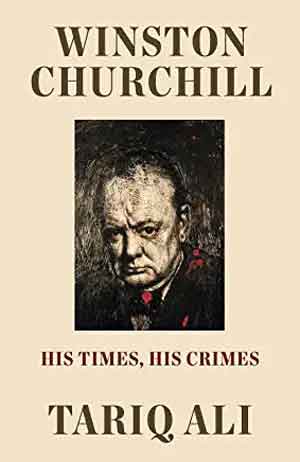WINSTON CHURCHILL: HIS TIMES, HIS CRIMES
Published in Book Reviews, Book Reviews, Issue 2 (March/April 2023), Reviews, Volume 31TARIQ ALI
Verso
£20
ISBN 9781788735773
Reviewed by Kevin Kiely
Kevin Kiely is the author of Harvard’s patron: Jack of All Poets (CreateSpace, 2018).
Tariq Ali, after writing The forty-year war in Afghanistan, ably presents Churchill using warlord tropes reflecting England’s planned agendas of imperialism in the lineage of Cromwell, (Robert) Peel, Gladstone, Thatcher and others.
Churchill’s Tory father, Randolph, a syphilitic, threatened his son to succeed or ‘my responsibility for you is over’. His American mother, Jennie Jerome, was ‘fond of Winston in absentia’. The manic-depressive boy grew up in fear of Irish rebellion during a sojourn in Dublin. He recalled his nurse ‘nervous about the Fenians […] wicked people […] we thought we saw a long dark procession of Fenians approaching […] the donkey expressed his anxiety by kicking. I was thrown off and had a concussion of the brain.’
Ali exposes Paul Bew’s Churchill and Ireland as hagiography comparable to The Churchill factor (Boris Johnson) and Finest years (Max Hastings), all post-Brexit fantasy history for souvenir-hunters, colonials and lost empire-seekers.
Ali quotes Desmond Fennell on revisionists, the mind-set wishing to ‘impose’ the blame for ‘Irish resistance’ as ‘a mixture of wrong-headed idealism and unnecessary, often cruel violence’. This ideology is outed as post-colonial tabloid media history omitting British conquest, famine and genocide.
The discussion on Ronan Fanning’s Fatal path extensively references James Joyce as a Home Ruler idolising Parnell: ‘They did not throw him to the English wolves: they tore him to pieces themselves’. W.B. Yeats is in close focus: ‘Yeats, much maligned for his wonderful poem “Easter, 1916”, was more in tune with the people than his detractors then and now’. Yeats’s ‘Easter, 1916’, quoted in full, makes Ali’s case about the poet, Anglo-Irish by birth, becoming republican and nationalist in homage to Connolly, Pearse, Markievicz and MacDonagh. Ali discusses the John Redmond and Churchill recruitment speeches for what they implied: ‘Irish bodies on the barbed wire in Flanders would be added to the British imperial stew’. After a speech in County Wicklow (1914) Churchill mocked the recruited cannon-fodder: ‘Ireland will fight, and Ireland will be right’.
Ali’s War of Independence section begins: ‘On 25 March 1920, [Churchill] dispatched the notorious “Black and Tans”, paramilitaries attached to the Royal Irish Constabulary (RIC), who served as a torture and death squad’. He revels in guerrilla war heroes, including the Listowel mutineer Jeremiah Mee, who absconded from the RIC, captured his former ‘boss’, Col. Gerard Smyth, and dispatched him. Churchill’s speech-making is compared to Edmund Burke’s over-boiled kettle of rhetoric: ‘this ancient monarchy, together with its ancient laws and liberties of this great and illustrious kingdom; […] may you stand the refuge of afflicted nations; may you stand a sacred temple, for the perpetual residence of an inviolable justice’. It could easily be Churchill’s hollow rhetoric.
Ali moves from the Boer War—‘Churchill doesn’t mention the concentration camps’ in his Morning Post articles—to Gallipoli, to India’s IRA (Indian Republican Army) and the British massacre in Jallianwala Bagh (Amritsar, 1919), and holds Churchill ‘responsible for the Bengal famine’ (1940), in which the death toll reached five million. ‘Indians breed like rabbits’, was his complaint. In Kenya Churchill’s methodology was ‘prison camps; in Caroline Elkins’s phrase: “a pornography of terror, including public brutality, rape, and starvation, swept through the villages as well, and thousands died there”.’ Significantly, Ali exalts Elkins’s Britain’s gulag: the brutal end of empire in Kenya as canonical.
Churchill demanded ‘an umbilical cord made of piano wire that would tie Britain to the United States in perpetuity’ in the era of Yalta (1945), following ‘the Moscow talks’ when ‘Stalin had kept his side of the Faustian pact and let Churchill take Greece’. He ranted to post-war leaders: ‘I will have no suggestion that the British Empire is to be put in the dock and examined by everybody […] I will not consent to forty or fifty nations thrusting interfering fingers into the life’s existence of the British Empire.’ Dean Acheson pointed out to him that Britain was ‘a minute island, in a tiny world’, at the White House farewell dinner (1953) for Truman.
There is reference to Obama and Biden removing a bust of Churchill (a present to George W. Bush) from the Oval Office. The reasons for dumping the monstrosity, according to Ali, was because of British atrocities in Kenya and Churchill’s record in Ireland, two of the imperial crimes with which he is charged in this book. The biography’s subtitle is ‘his times, his crimes’. Churchill felt that those who opposed his ruthless methods were being ‘squeamish’, which was one of his ‘favourite words to justify atrocities’.
There is discussion of the ‘Churchill cult’ and the graffiti campaign (2000–20) on his statue in Parliament Square: ‘Churchill Was a Racist’. Tony Blair remarked that ‘this sort of thing must never happen again’. Nicholas Soames was outraged by the Daily Telegraph debating ‘granddad’ as ‘white racist and “worse than the Nazis”’. Ali demands dual signage for imperial cult ‘heroes’ and quotes many detractors, including Welsh actor Richard Burton: ‘I hate Churchill and all of his kind […] a bad man […] a vindictive toy soldier child’. Ali’s model is Benedetto Croce for creating historical biography as ‘artistic production […] to represent what really happened’.

















